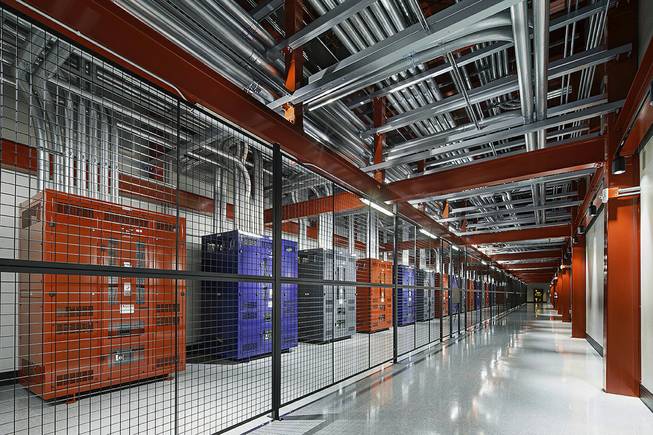
Courtesy of Switch
Las Vegas-based data center Switch hopes to leave the energy grid and produce its own power.
Tuesday, July 14, 2015 | 2 a.m.
When the economy crashed in 2007, companies across the country scrambled to cut their power bills.
They reduced costs by investing in renewables, energy efficiency programs and on-site generation.
While the efforts were meant to be a Band-Aid to stave off the effects of the recession, many companies now say their energy strategies are paying off, according to a new study by Deloitte Energy Solutions.
The study indicates that an ongoing attempt by technology company Switch and several major casinos to exit NV Energy is part of a larger trend — one that shows no sign of abating.
More than half the companies in the study said they have some type of on-site power generation that’s not owned or operated by a utility — a more than 10 percent increase over the number that a Deloitte study last year found. Of the 600 firms Deloitte reached out to, 79 percent said that cutting energy costs was integral to remaining competitive.
It's a growing trend in corporate America: Businesses want to have more control over how they create and consume energy.
Nevada’s energy market could be remade by that effort. The state’s influential casinos, along with Switch, are working to purchase or create power without the state’s largest power company, NV Energy. They are among the power company’s biggest customers and currently trying to take advantage of a law that would allow them to sever ties with the approval of the Public Utilities Commission of Nevada.
This week, officials with casinos, NV Energy, and the PUC will have public and private meetings to discuss such an exit.
Switch, whose clients include companies like eBay and Sony, says it wants to power its data centers with 100 percent renewable energy in the coming years.
Although the broader trend has environmental effects, cutting costs is the main factor driving companies to invest in their energy infrastructure, according to Marlene Motyka, an energy expert with Deloitte who worked on the study.
Going green is an added bonus, she said.
Since 2005, companies that aren’t in the business of selling power have increased their energy generation by more than 50 percent, according to federal data. Those include supermarket chain Kroger, which owns Smith’s, has pioneered efforts to cut back on energy costs.
In Compton, Calif., it uses a system to turn unsold produce, bread and organic waste into biofuels to power its distribution center, according to The Wall Street Journal.
The company also uses wind turbines to power a dairy — a move that cut power bills at the facility by 25 percent.
The Deloitte study offered one good reason why the push toward distributed generation is unlikely to end soon. When asked about their energy forecasts over the next two years, 35 percent of companies expected to see their power bills rise 5 to 15 percent.

Join the Discussion:
Check this out for a full explanation of our conversion to the LiveFyre commenting system and instructions on how to sign up for an account.
Full comments policy